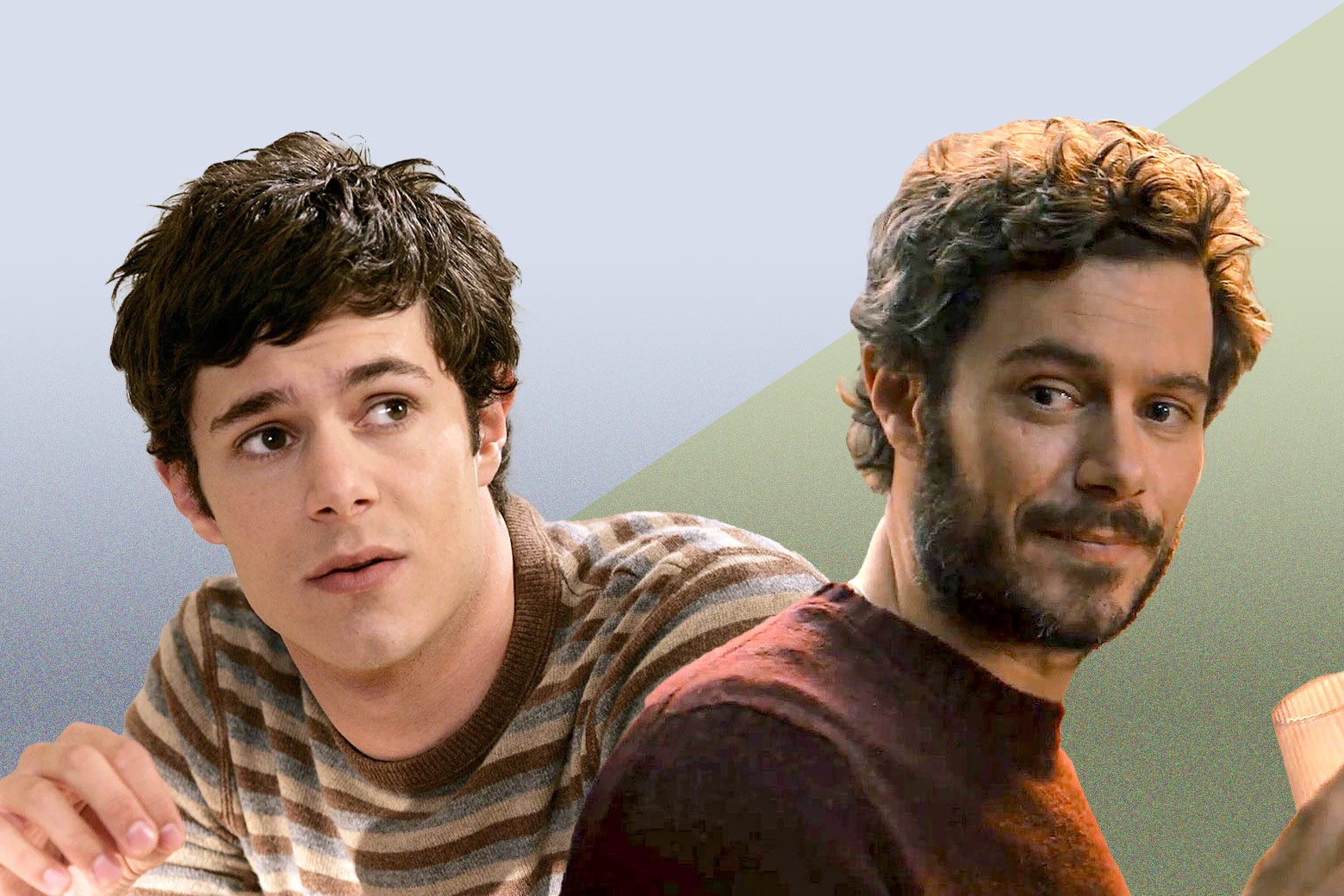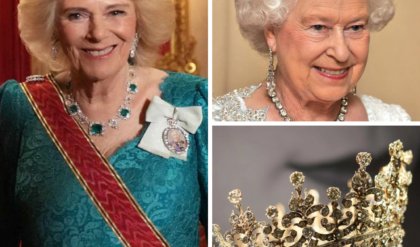As Seth Cohen, he was the ultimate swoon-worthy nerd. Twenty years later, he’s still got it.

Contra to the series’ title, audiences did want Nobody Wants This, Netflix’s new comedy about a hot rabbi and a godless podcast host who find love. The show, which stars Adam Brody as Rabbi Noah and Kristen Bell as podcaster Joanne, has hovered around the top of Netflix’s most-watched list since its release in late September and has earned some particularly swoony reviews, with the Guardian going so far as to proclaim the series “as funny as When Harry Met Sally.” On social media, too, I’ve seen Nobody Wants This hailed as a return to the rom-com promised land after years of wandering in a chemistry-less, banter-free desert.
To this extremely enthusiastic response, I just want to say: Whoa there. I liked the show well enough, but let’s be honest—the reason viewers are losing their minds over it is very clear, and not indefensible. It’s the power of Adam Brody.
Brody has been the thinking millennial woman’s crush for years now, going back to his time playing Seth Cohen on the teen soap The O.C. (and, to a lesser extent, Dave Rygalski on Gilmore Girls before that). Seth’s impact was vast; he has been credited with everything from coining new words to ruining a generation of women. If you’d care to join me on a beachfront walk down memory lane, I will remind you what was so revolutionary about this character and the reason he still has a hold on people two decades later. Teen soaps before The O.C. had crowned sex symbols, but this show’s innovation was creating a sex symbol who was also, sort of, a nerd. Seth wasn’t actually a nerd in any meaningful sense of the word, but he was an outsider by virtue of being a half-Jewish comic-book and indie-band obsessive in a high school dominated by Abercrombie models (literally). Though Ryan was ostensibly the main character, you couldn’t not fall for Seth’s witty dialogue, impish facial expressions, and skater wardrobe. He also had a sweet side, as demonstrated in his yearslong crush on his classmate Summer. Their romance eventually became one of the show’s key storylines and led to some of its most memorable moments, like their re-creation of the upside-down “Spider-Man kiss,” a scene that launched a thousand YouTube montages.
Seth’s breakout status was apparent just months into the show’s run. You could see it not just in the way lovestruck audiences reacted to him, but in the show itself. In an episode that aired during the holiday season, Seth gifted “Seth Cohen starter packs” to the girls in his life. They contained a mix of CDs, DVDs, and books that reflected his highly sophisticated personal taste: Death Cab for Cutie, Michael Chabon, etc. Midway into what was still the series’ first season, Seth Cohen was already enough of a phenomenon that The O.C. was reflecting it back to the audience.
Though there are a lot of explanations for why this character captured the zeitgeist—including the larger moment for nerd culture that the show fit into—anyone could tell that it worked in large part because Brody made it work. He embodied the character in a way no one else could have. Soon, even the popular girls wanted to date a Seth Cohen. He was a fictional character, but he changed people’s ideas about what was attractive in a real way. In the years since, GQ has called him a 2000s style icon, the Daily Beast has mused about his effect on a generation of women’s dating lives, Vulture has deemed him a “gateway to indie culture,” and so on. All of this is to say that if you’re ever looking for an easy way to bond with a millennial woman, asking her if she had a crush on Adam Brody—himself a member of Gen X—is a decent bet.
It’s tempting to ask why Brody didn’t become a bigger star. Coming out of The O.C., Brody had a name that got thrown around when people wrote about which young actors had a chance at becoming Hollywood’s next big thing. It’s not clear whether Brody himself aspired to that level of fame. We do know that he wanted to be seen as more than his most famous character, and Brody has admitted to “resisting Seth Cohen-adjacent roles” for years, as a recent New York Times profile put it. He had some bad luck, such as when the George Miller–directed version of Justice League he was supposed to star in as the Flash failed to come to fruition. (Brody eventually made his way into superhero movies via the Shazam! films.) You can find a few articles from this period that regard Brody’s post–O.C. years as a failure, but although none of his projects managed the extremely difficult task of being as popular as The O.C., he worked steadily all the while, building up a solid list of credits in the past few years especially, with supporting roles in American Fiction, Promising Young Woman, and Fleishman Is in Trouble.
Despite his disappearance from the spotlight, fans never stopped loving Brody. One reason is that he happened to do a very crush-worthy thing in his personal life during those years: date and then marry the actress Leighton Meester, who played Blair Waldorf on Gossip Girl, the show many would consider The O.C.’s successor. Even if Brody wasn’t a romantic lead in movies, this made him seem like one in real life. Despite his active effort to be un–Seth Cohen–like, weren’t his fans helpless in the face of adorable couple photos of the two former teen-drama icons? Associating them with their characters came easily; it didn’t matter that they weren’t in the same series—in fact, it just went to show that Seth Cohen transcended worlds.
In the Times piece, co-star Bell—who deserves major credit for suggesting to Nobody Wants This creator Erin Foster that Brody take the role in the first place, as several outlets have reported—describes Brody as “incredibly picky” about which projects he chooses to do. This doesn’t altogether dispel the idea that Brody one day decided he was ready to be everyone’s crush again, thus bringing us this Netflix series. The long shadow Seth Cohen casts hasn’t been lost on viewers and critics, many of whom have remarked on the similarities between the O.C. character and Noah. Even Foster has referred to him as an “adult version of Seth Cohen.” Noah is funny like Seth, and Jewish like Seth, but he’s also his own thing, more chill and self-assured. (Some critics have found fault with the show’s portrayal of Judaism, but these criticisms have mostly concerned characters who aren’t the “hot rabbi.”) He’s a dream man built for 2024 in that he’s unusually patient and emotionally mature. When Bell’s character, who is prone to theatrics, has a little freak-out, Noah resolutely puts his hands on her shoulders, looks her in the eye, and says, “I can handle you.” Is this Netflix or in fact audio erotica for women?
So much of this show is about wish fulfillment, and it turns out seeing an actor they’ve loved for 20 years in a new rom-com is many people’s wish. Millennial nostalgia is peaking alongside millennial midlife crises. Brody isn’t even the only former teen-soap babe with a new TV show. I suspect that no small part of the new ABC medical drama Doctor Odyssey’s audience will be millennial women tuning in for Joshua Jackson, another former teen-show dreamboat, and who could blame them? Still, that series hasn’t inspired nearly the level of glee that Nobody Wants This has. I would argue that Brody’s pull is stronger, plus he’s been out of the romantic-lead game longer. Millennials are also nostalgic for a time when rom-coms were plentiful and many of them were actually good. In the streaming era, any decent rom-com—and, to be clear, this one is much better than what we usually get without quite managing to be great—feels like a gift, and we grade on a curve. Watching your teenage crush still being cute all these years later will make you inclined to forgive a lot. So what if the show felt kind of flimsy at times, because how good did Adam Brody look with that beard?
Sooner or later, I think some of the giddiness surrounding Brody’s triumphant return to crush object will die down, and people will realize that Noah Roklov is a character who lacks the staying power or cultural influence of a Seth Cohen. But in the meantime, I’m glad the show is so well liked because it should, with any luck, lead to many more Adam Brody performances, including maybe, eventually, one that actually gives Seth Cohen a run for his money.





